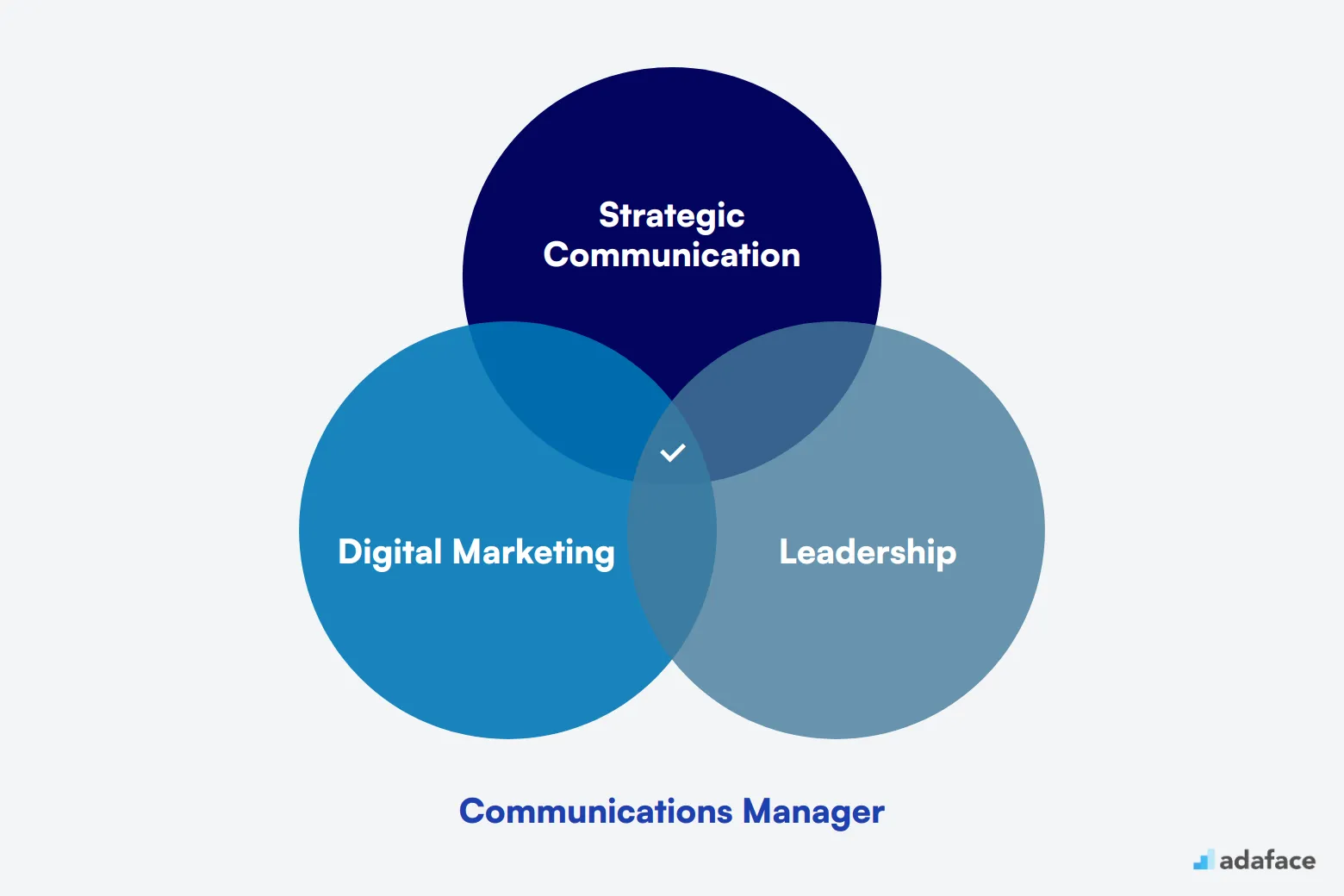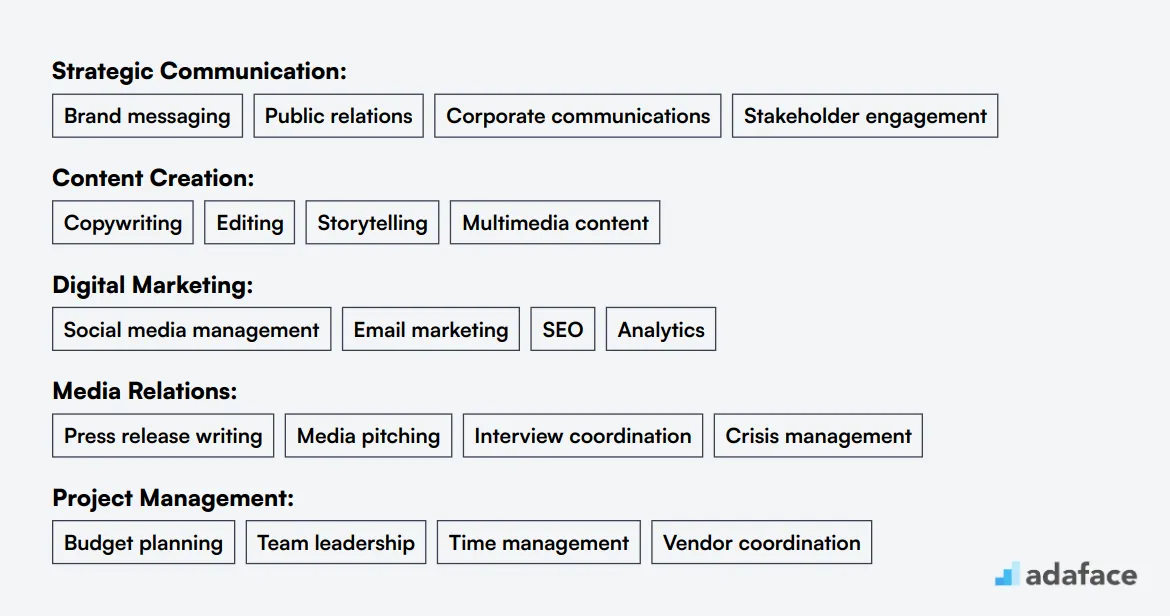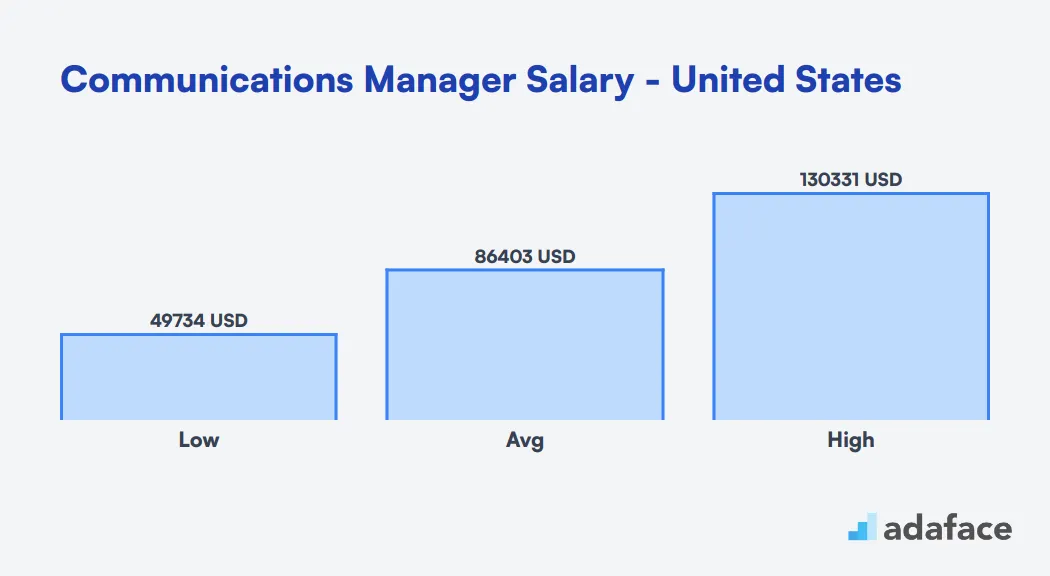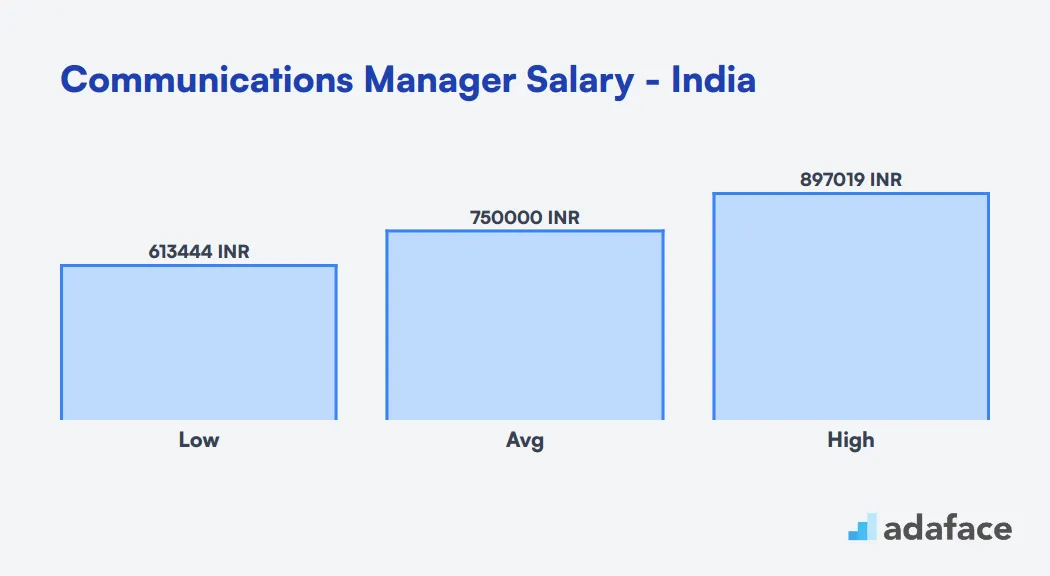Hiring a Communications Manager is critical for any organization seeking to amplify its brand voice and streamline internal and external communications. Often, companies miss the mark by not aligning the manager's skills with the organization's communication strategy and goals. A successful Communications Manager should be articulate, strategic, and adaptable, with an ability to interpret and convey messages across multiple channels effectively.
This article guides recruiters and hiring managers through the process of hiring a Communications Manager. We discuss the key skills and qualifications to look for, platforms where you can find top candidates, and various assessment strategies to ensure you secure the best fit for your team. For more insights, explore our Communications Manager Interview Questions.
Table of contents
Why hire a Communications Manager?
A Communications Manager can help address key business challenges related to brand perception, internal communication, and public relations. For example, if your company is struggling with inconsistent messaging across different channels or departments, a Communications Manager can develop and implement a unified communication strategy.
Consider hiring a Communications Manager when:
- Your company is expanding and needs a cohesive voice
- You're facing a PR crisis or need to improve media relations
- Internal communication breakdowns are affecting productivity
Before committing to a full-time hire, assess your needs and budget. For short-term projects or smaller organizations, working with a communications consultant might be a more suitable option. As your communication needs grow more complex and ongoing, transitioning to a full-time Communications Manager becomes a smart investment.

Skills and qualifications to look for in a Communications Manager
Before you start the hiring process, it's important to nail down the ideal candidate profile for a Communications Manager in your organization. What's essential for one company might be just a nice-to-have for another. For instance, while some companies might require a strong focus on crisis communication, others may place more emphasis on digital marketing skills.
To create a clear and effective candidate profile, it's crucial to differentiate between required and preferred skills and qualifications. This approach ensures that you attract applicants who meet your organization's unique needs. For a deeper understanding of communication roles, you might want to explore our communication assessment tools, which provide insights into assessing candidates effectively.
| Required skills and qualifications | Preferred skills and qualifications |
|---|---|
| Bachelor's degree in Communications, Journalism, or related field | Master's degree in Communications or related field |
| 5+ years of experience in communications or public relations | Experience in crisis communication management |
| Excellent written and verbal communication skills | Familiarity with graphic design and video editing software |
| Strong project management and organizational abilities | Knowledge of SEO and digital marketing strategies |
| Proficiency in social media management and content creation | Multilingual capabilities |
Top Platforms to Find Communications Managers
Now that you have a well-crafted job description, it's time to post it on job listing sites to attract potential candidates. The right platform can make a significant difference in finding the ideal Communications Manager for your team. Let's explore some of the best options available for sourcing top talent in this field.
Other notable platforms include Glassdoor, which provides company reviews and salary insights, We Work Remotely for remote positions, and Monster for its wide candidate database. For startups, AngelList is a great option to connect with early-stage professionals. Freelance-focused platforms like Upwork and Fiverr are ideal for short-term projects or specific tasks. When choosing a platform, consider factors like your hiring process and the type of role you're offering to ensure the best match for your needs.
Keywords to Look for in Communications Manager Resumes
Resume screening is a critical first step in the hiring process for Communications Managers. It helps you quickly identify candidates with the right skills and experience before moving on to more in-depth evaluations.

When manually screening resumes, focus on key terms related to strategic communication, content creation, and digital marketing. Look for specific skills like brand messaging, public relations, copywriting, and social media management. Also, pay attention to candidates' experience with project management and media relations.
To streamline the process, consider using AI-powered tools like ChatGPT or Claude. These can help you analyze resumes more efficiently by automatically identifying relevant keywords and providing initial recommendations for shortlisting candidates.
Here's a sample prompt for AI-assisted resume screening:
TASK: Screen resumes for Communications Manager role
INPUT: Resumes
OUTPUT: For each resume, provide:
- Name
- Matching keywords
- Score (out of 10)
- Recommendation
- Shortlist (Yes/No/Maybe)
KEYWORDS:
- Strategic Communication (brand messaging, public relations)
- Content Creation (copywriting, storytelling)
- Digital Marketing (social media management, SEO)
- Media Relations (press releases, crisis management)
- Project Management (team leadership, budget planning)
Customize this prompt based on your specific job requirements and company needs.
Top skills tests to assess Communications Manager candidates
Skills tests are an effective way to evaluate Communications Manager candidates beyond their resumes. They provide objective insights into a candidate's abilities and help you make data-driven hiring decisions. Here are five recommended tests to assess your Communications Manager applicants:
Communication Skills Test: This communication test evaluates a candidate's ability to convey ideas clearly and effectively. It assesses written and verbal communication skills, which are core competencies for any Communications Manager.
Marketing Aptitude Test: A marketing aptitude test helps gauge a candidate's understanding of marketing principles and strategies. This is valuable for Communications Managers who often work closely with marketing teams.
Content Strategy Test: Use a content strategy test to evaluate a candidate's ability to plan, create, and manage content across various platforms. This skill is key for developing effective communication strategies.
Copywriting Test: A copywriting test assesses a candidate's ability to write persuasive and engaging content. This skill is important for creating impactful messages across different mediums.
Digital Marketing Test: In today's digital landscape, a digital marketing test can help assess a candidate's knowledge of online communication channels and strategies. This is useful for Communications Managers who need to navigate various digital platforms.
Case Study Assignments to Evaluate Communications Manager Candidates
Case study assignments can be valuable tools for assessing Communications Manager candidates. However, they come with drawbacks such as lengthy completion times, lower participation rates, and the risk of losing qualified applicants. Despite these challenges, well-designed case studies can provide insights into a candidate's skills and problem-solving abilities.
PR Crisis Management Scenario: Present candidates with a hypothetical public relations crisis and ask them to develop a comprehensive communication strategy. This assignment tests their ability to handle sensitive situations, craft messaging, and manage stakeholder relationships. It's an excellent way to evaluate their crisis communication skills.
Brand Repositioning Campaign: Task candidates with creating a plan to reposition a fictional brand in a new market. This case study assesses their strategic thinking, market analysis capabilities, and creativity in developing communication campaigns. It also showcases their ability to align messaging with business objectives.
Internal Communication Overhaul: Provide a scenario where a company needs to improve its internal communication processes. Ask candidates to propose a plan to enhance information flow and employee engagement. This assignment evaluates their understanding of organizational communication dynamics and their ability to implement effective strategies.
How Much Does It Cost to Hire a Communications Manager?
Hiring a Communications Manager comes with varying costs depending on factors like location and experience. In the United States, average salaries range from $49,700 to $130,300, with a median of $80,500. In India, the average salary is around ₹750,000 per year, ranging from ₹613,445 to ₹897,019. Top-paying cities in the US include New York and Chicago, while in India, Gurgaon and Mumbai offer higher salaries.
Communications Manager Salary in the United States
The average salary for Communications Managers in the United States ranges from $49,700 to $130,300, with a median of $80,500. Salaries can vary based on factors like location, experience, and industry.
Top-paying cities include New York, NY (median: $89,400), Chicago, IL (median: $87,900), and Washington, DC (median: $85,000). Entry-level positions in smaller markets like Wichita, KS may start around $40,800, while experienced managers in major cities can earn up to $147,600.

Communications Manager Salary in India
The average salary for a Communications Manager in India is around ₹750,000 per year. Salaries can range from ₹613,445 to ₹897,019 depending on the location and the level of experience.
In metropolitan areas like Gurgaon and Mumbai, salaries tend to be on the higher end, with averages reaching up to ₹958,333 and ₹761,017 respectively. Conversely, cities like Chennai and Kolkata may offer lower averages, around ₹537,888 and ₹454,615.

What's the difference between an Internal Communications Manager and an External Communications Manager?
Many people often confuse the roles of an Internal Communications Manager and an External Communications Manager, despite their distinct responsibilities. This misunderstanding arises because both roles are integral to a company's communication strategy, yet they target different audiences and objectives.
An Internal Communications Manager primarily focuses on employee engagement within the organization. They handle tasks such as crafting internal newsletters and fostering organizational culture, using channels like intranet and email to connect with employees. Typical backgrounds include HR or organizational communication, and success is measured through employee satisfaction surveys.
Conversely, an External Communications Manager is responsible for managing the company's image and relationships with the media and the public. They create press releases, handle media relations, and utilize social media and press outlets to communicate with external stakeholders. Professionals in this role often come from public relations or marketing backgrounds, with success metrics based on media coverage and public sentiment.
| Internal Communications Manager | External Communications Manager | |
|---|---|---|
| Primary Audience | Employees | Media, Public |
| Key Responsibilities | Employee Engagement, Internal Newsletters | Press Releases, Media Relations |
| Communication Channels | Intranet, Email | Social Media, Press |
| Skills Required | Team Collaboration, Internal Networking | Public Speaking, Media Handling |
| Strategic Focus | Organizational Culture | Brand Image |
| Challenges | Maintaining Employee Engagement | Crisis Communication |
| Metrics of Success | Employee Satisfaction Surveys | Media Coverage, Public Sentiment |
| Typical Background | HR, Organizational Communication | Public Relations, Marketing |
What are the ranks of Communications Managers?
Many people often confuse the role of a Communications Manager with other marketing or PR positions. This confusion arises because the responsibilities can overlap, especially in smaller companies. Understanding the hierarchy within communication roles can help clarify their distinct functions.
• Communications Coordinator: This entry-level position supports the communications team by assisting with various tasks such as scheduling meetings, maintaining databases, and drafting basic content. They are vital for ensuring smooth operations within the department.
• Communications Specialist: A step above the coordinator, specialists are responsible for creating and implementing communication strategies. They draft press releases, manage social media accounts, and analyze engagement metrics.
• Communications Manager: Managers oversee the entire communications strategy and team. They ensure that messaging aligns with organizational goals, manage budgets, and represent the company at external events.
• Senior Communications Manager: This role involves strategic oversight and typically requires extensive experience. The Senior Communications Manager collaborates with upper management to shape the long-term communication vision of the organization.
• Director of Communications: The director is responsible for the overall communication strategy and initiatives of the organization. They lead the communications team, set goals, and ensure that messaging is consistent across all platforms.
• Chief Communications Officer (CCO): As a top executive, the CCO shapes the organization's communication policies and practices. This role typically involves working closely with the CEO and other executives to guide the company’s overall communication approach.
How to Secure the Best Communications Managers for Your Team
Throughout this blog post, we've explored the importance of hiring a Communications Manager, the top skills and qualifications to look for, and the platforms where you can find ideal candidates. We've also discussed the importance of case study assignments and the cost considerations involved in the recruitment process.
If there's one key takeaway from this guide, it's to focus on crafting precise job descriptions and utilizing skills assessments to refine your hiring process. Employing targeted tests like the Communication Test can help identify the top candidates who will most effectively meet your requirements.
Communication Skills Test
FAQs
A Communications Manager is responsible for creating and managing internal and external communications strategies, ensuring coherent messaging across various channels to support organizational goals.
Key skills include excellent written and verbal communication, strategic thinking, leadership, and proficiency in digital communication tools. Familiarity with public relations and marketing strategies is also beneficial.
You can find candidates on professional networking sites like LinkedIn, specialized job boards, and recruitment agencies. Additionally, utilizing platforms like Adaface can help streamline your search.
Consider using skills tests and case study assignments to evaluate a candidate's communication abilities and strategic thinking. Check out our Communication Test for more structured assessment methods.
An Internal Communications Manager focuses on communication within the organization to boost employee engagement, while an External Communications Manager manages public relations and media engagement to enhance the company's public image.
Ranks can vary but typically include Communications Coordinator, Communications Specialist, Communications Manager, Director of Communications, and Chief Communications Officer.
Offer competitive compensation, clear career progression paths, and a collaborative work environment. Utilizing tailored assessment platforms like Adaface Skills Assessment Tools can also help attract the right talent.

40 min skill tests.
No trick questions.
Accurate shortlisting.
We make it easy for you to find the best candidates in your pipeline with a 40 min skills test.
Try for freeRelated posts
Free resources



